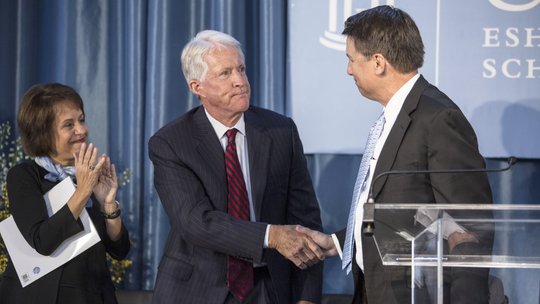
What would you do with a $100 million gift? Ask John Bamforth, executive director of the Eshelman Institute for Innovation at UNC-Chapel Hill, and he would tell you to point it at seeking innovative solutions in health care.
That’s what the Eshelman Institute is doing – an effort that, thanks to its new venture studios initiative, is working to create companies hoping to solve major problems in North Carolina.
Pharma executive and philanthropist Fred Eshelman’s $100 million gift back in 2014 was, at the time, the largest gift UNC had ever received – and it’s still paying dividends to the university's pharmacy school.
Bamforth said the Eshelman Institute has always looked to translate “the brightest and best ideas from Carolina” into licensing opportunities or new companies.
Initially it focused on developing new drugs. A good example of its innovation is Readdi, a nonprofit venture developed during Covid-19 to focus on antivirus treatments – to help better prepare the world for the next time a global pandemic hits.
The venture studios initiative has been about three years in the making. Bamforth said venture studios, unlike traditional venture capital, doesn’t wait for the founders to come to them with a pitch.
“With a venture studio, what they will do is they will do the diligence on ideas and then when they’ve got an idea that they believe can be a "venture-backable" firm, they’ll go find the founders,” he said.
A venture studio then provides all the back office support – from marketing, to finance, to legal – so the founders can focus on advancing the idea into a real product. The goal is to accelerate the time needed to get from an idea’s inception through its first big fundraise. In the case of Eshelman Institute, the focus is on digital health.
Eshelman Institute teamed up with existing venture studios including High Alpha Innovation of Indianapolis and began sorting through ideas from faculty at Carolina.
A year ago, the effort expanded further, thanks to a surprise infusion of opioid settlement funds from the North Carolina General Assembly, to the tune of $2.5 million.
As the center of the opioid crisis is Appalachia, the Institute went to Asheville – using the venture studio concept in a different way. Instead of designing a product, initially it was designing a thinking process – pointing its methodology at a problem to see if there was a “venture-backable company” that could come out of the work.
For six months, a team was embedded in Asheville, studying all parts of the patient journey, from the first exposure to opioids through recovery. And the observations led to ideas. One came from the discovery that when an overdose happens, time is critical.
“You’ve got a 72-hour window to surround them with services, accommodation, food, et cetera,” Bamforth said.
Right now, it’s a manual process, primarily carried out by EMTs making phone calls, trying to get patients into treatment facilities. The new company the Institute is setting up aims to automate that process with a digital health tool. The venture, called Goldie, has yet to be incorporated, but it’s an example of how the idea process can lead to a company – and something the Eshelman Institute wants to repeat.
Bamforth envisions similar efforts aimed at other health care problems across the state. The plan is for High Alpha to work with UNC, raising a pre-seed investment fund for the new companies in 2024.
“The desire is for this fund to be the first money into the new companies,” Bamforth said.
The main venture studio is based in Chapel Hill, with the offshoot in Asheville and another in Greensboro (funded by a Humana Foundation $3.5 million grant and focused on food insecurity in the African American population).
But Bamforth would love an offshoot at the coast, possibly in Wilmington, and another in Charlotte.
“We’re about finding innovative ways to solve big health care problems,” he said. “Our ambition is to have five hubs across the state.”
Bamforth said conversations are also happening with high net-worth individuals interested in impact investing. Amazon (Nasdaq: AMZN) is among its current partners – having provided resources to Goldie in Asheville. And the hunt is on for more partners as the effort expands in scope.
Bamforth said the institute plans to keep amplifying Eshelman’s original gift, one innovation at a time.
“It creates a positive cycle of both innovation and entrepreneurship,” he said.